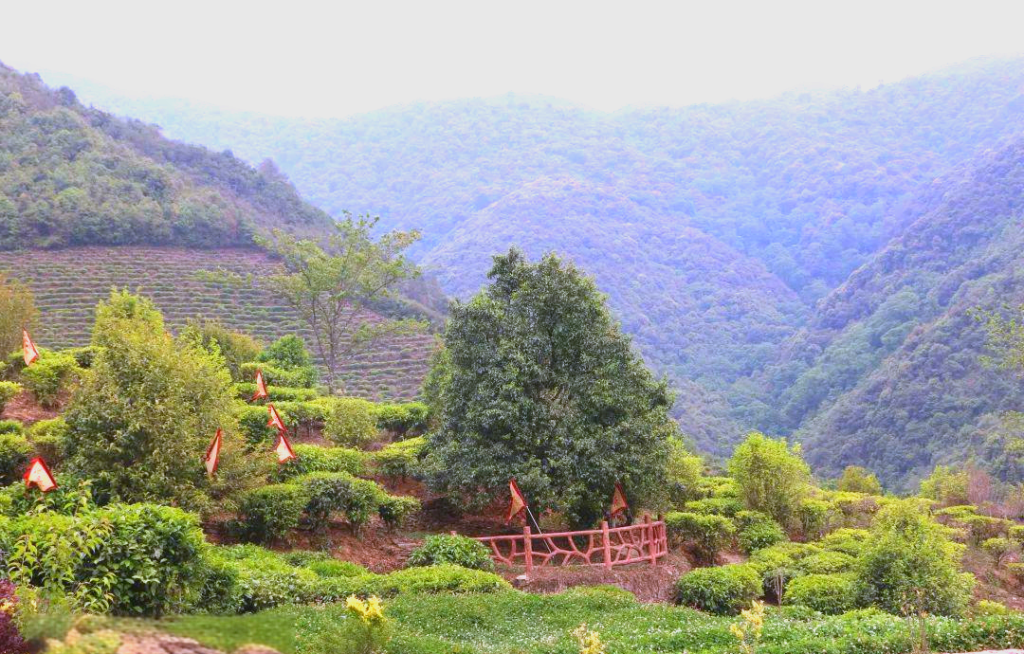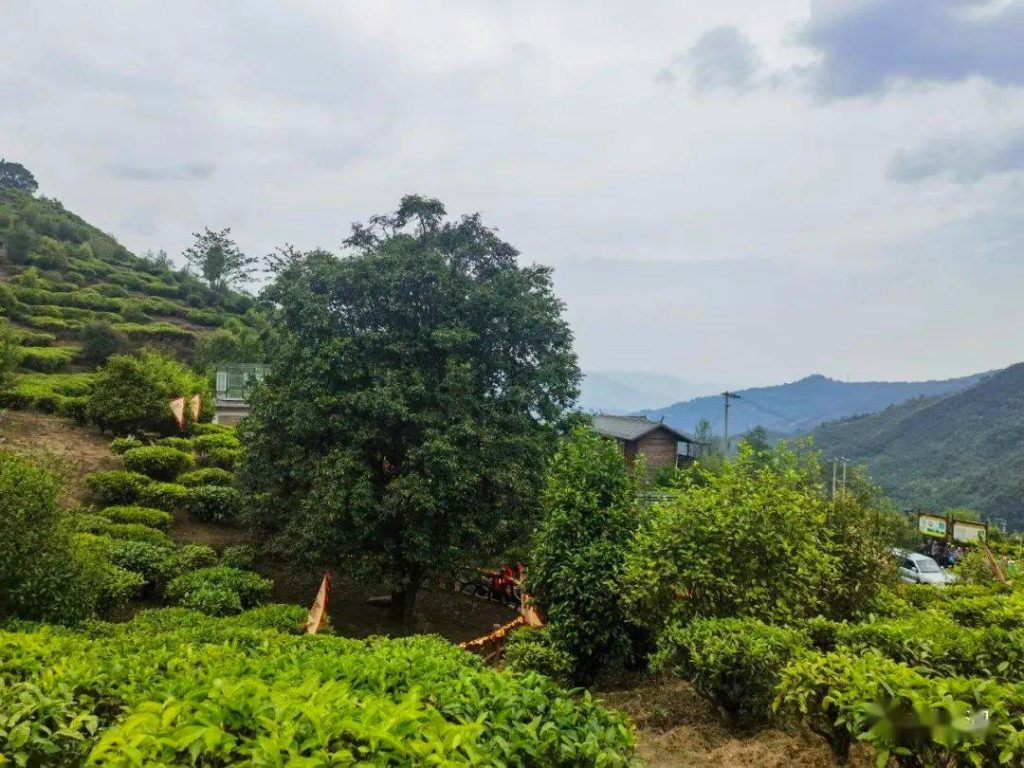
King of The Tea Tree of Wuliang Mountain in Xiaogude Village of Nanjian County, Dali
Chinese Name: 南涧县无量山镇小古德村茶树王
English Name:King of The Tea Tree in Xiaogude Village in Nanjian County, Dali
Location:南涧县无量山镇小古德村子
King of The Tea in Xiaogude Village is located in Xiaogude Tea Garden of Wuliang Mountain in Nanjian County.
Xiaogude Village (小古德村), nestled in the heart of Wuliangshan Town (无量山镇), Nanjian County (南涧县), Dali Prefecture (大理州), is famous for its extraordinary tea culture. The village is home to extensive tea gardens, covering an impressive area of over 5,000 acres, and is famed for the “Thousand-Year Tea King” (千年茶王)—an ancient tea tree that has stood the test of time for over 1,200 years. The tree sits in the lush green hills at an altitude of 2,100 meters (6,890 feet) and has become a symbol of the rich tea history of this region.
The Enchanting Beauty of Tea Gardens
As you wander through the tea gardens of Xiaogude, you’ll be greeted by the fragrant aroma of tea leaves carried by the spring breeze. The landscape is a vibrant tapestry of green, where the terraced fields are meticulously cultivated, and the rows of tea trees stretch endlessly into the horizon. The journey through this scenic terrain feels like walking through a living painting.
The “Thousand-Year Tea King”: A Majestic Natural Wonder
At the heart of the Xiaogude Tea Garden stands the “Thousand-Year Tea King”, an awe-inspiring tea tree that has become a legendary figure in the tea community. Its impressive stature and longevity have made it a revered landmark. The tree’s height is around 16 meters (52.5 feet), with a canopy diameter of 9.2 meters (30 feet), and its trunk boasts a circumference of 171 cm (67.3 inches).
This ancient tree produces fresh tea leaves every year, making it one of the most productive tea trees in the world, despite its impressive age. Each year, tea farmers harvest approximately 50 kg (110 lbs) of fresh tea leaves and 20 kg (44 lbs) of tea fruit, which is extraordinary for a tree of such age.
Harvesting and Tea Making Experience
In the spring, as tea farmers harvest the tender tea shoots, visitors can enjoy the experience of hand-picking tea leaves. This age-old practice, combined with the breathtaking landscape of Wuliangshan, offers an unforgettable experience. The leaves undergo an intricate process of withering, pan-frying, rolling, and drying to produce “spring tea” (春茶), renowned for its freshness, richness, and sweet aftertaste.
Visitors are also invited to make their own tea from the leaves, following traditional methods: warming the teapot, adding tea leaves, and carefully pouring hot water to brew a cup of tea that will remind them of the mountain’s fresh spring air. The rich aroma and complex flavors that emerge during the brewing process reflect the deep connection between the people, the land, and the ancient tea tree.
The Legend of the “Thousand-Year Tea King”
Ancient Origins and Remarkable Resilience
The “Thousand-Year Tea King” has long been considered a national treasure for its exceptional age and the valuable tea it produces. It is located in the Wuliangshan (无量山), a mountain known for its ideal tea-growing conditions, with abundant rainfall, fertile soil, and moderate temperatures. This remarkable tree is a symbol of resilience, having withstood centuries of weather changes, human interference, and the changing tides of history.
The Role of Local Villagers in Tea Culture
Local villagers have lived in harmony with this ancient tree for generations, protecting it as a cultural and natural asset. Many local stories and legends are passed down about the “Thousand-Year Tea King”. Some believe it is over 1,200 years old, dating back to the Qing Dynasty (清朝) during the Kangxi Era. The tree’s roots run deep, both in the soil and in the community’s cultural identity.
The villagers recount that over 200 years ago, families settled near the tree, noticing its significance and began cultivating the land with tea plants. By 1940, local landowners started planting tea in the area. In 1964, the first Xiaogude Tea Garden was established, creating a model of sustainable tea cultivation and nurturing the legacy of the ancient tree.
The Tea Culture of Wuliangshan
Wuliangshan: The Heart of Tea Production in Yunnan
The Wuliangshan Tea Region (无量山茶区) is one of the most prominent tea-producing areas in Yunnan Province (云南省). The fertile hills of Wuliangshan have been growing tea for centuries, and the tradition continues to this day. The region is particularly famous for its wild ancient tea tree clusters, which produce some of the most sought-after teas in the world.
The tea produced in this region is renowned for its unique flavor, characterized by a smooth texture, rich aroma, and long-lasting aftertaste. Tea from the “Thousand-Year Tea King” is highly valued, not only for its exquisite taste but also for its historical significance. It is considered a true delicacy among connoisseurs and collectors.
The “Phoenix Pressed Tea” (凤凰普洱沱茶)
Among the various teas produced in Wuliangshan, Phoenix Pressed Tea is particularly famous. This Pu’er tea (普洱茶) is crafted from the finest Yunnan big-leaf tea and pressed using high-altitude mountain spring water from Taiji Mountain (太极山). The tea is known for its tight, compact appearance, ruby-red color, full-bodied aroma, and smooth, lingering taste. It is also highly resilient, with the ability to withstand multiple infusions without losing its flavor.
Tips for Visiting Xiaogude Village and Tea Gardens
Location and Accessibility
Xiaogude Village is located about 55 km (34 miles) from Nanjian County (南涧县) and can be easily accessed by car via the Nanning Expressway and National Road 215, before turning onto Rural Road 043. It takes approximately 90 minutes to travel from Nanjian County to the village, where visitors can explore the tea gardens and the legendary “Thousand-Year Tea King”.
Tea-Tasting and Other Activities
When you visit Xiaogude Village, you can enjoy a variety of activities related to tea culture, including:
-
Tea picking: Experience the traditional method of hand-harvesting tea leaves, which is a labor of love passed down through generations.
-
Tea-making: Learn the traditional methods of tea preparation, from warming the teapot to brewing the perfect cup of tea.
-
Barbecue: In addition to tea-related activities, visitors can also enjoy a DIY barbecue, providing a delightful opportunity to savor local delicacies while surrounded by the natural beauty of the tea mountains.
Best Time to Visit
The best time to visit Xiaogude Village is in spring, when the tea trees are in full bloom, and the weather is warm but not too hot. This is when the “Thousand-Year Tea King” is harvested, and the area comes alive with the activity of tea farmers and visitors alike.
A Journey Into Tea Culture
A visit to Xiaogude Village and the Wuliangshan Tea Region offers a unique opportunity to explore the rich history and traditions of tea cultivation in Yunnan Province. From the legendary “Thousand-Year Tea King” to the lush tea gardens, every moment spent in this tranquil setting deepens your connection to nature and the cultural heritage of tea. Whether you’re a tea enthusiast, a nature lover, or a curious traveler, Xiaogude Village offers an unforgettable journey into one of China’s most treasured tea regions.
Travel Tip: For a truly immersive experience, take your time to explore the tea gardens, meet the local tea farmers, and sample the finest teas that have been cultivated and harvested in these hills for over a millennium. Whether it’s the fresh spring tea or the ancient leaves from the “Thousand-Year Tea King”, the flavors are sure to delight your senses.

 7 Days GolfingTour
7 Days GolfingTour
 8 Days Group Tour
8 Days Group Tour
 8 Days Yunnan Tour
8 Days Yunnan Tour
 7 Days Shangri La Hiking
7 Days Shangri La Hiking
 11 Days Yunnan Tour
11 Days Yunnan Tour
 6 Days Yuanyang Terraces
6 Days Yuanyang Terraces
 11 Days Yunnan Tour
11 Days Yunnan Tour
 8 Days South Yunnan
8 Days South Yunnan
 7 Days Tea Tour
7 Days Tea Tour
 8 Days Muslim Tour
8 Days Muslim Tour
 12 Days Self-Driving
12 Days Self-Driving
 4 Days Haba Climbing
4 Days Haba Climbing
 Tiger Leaping Gorge
Tiger Leaping Gorge
 Stone Forest
Stone Forest
 Yunnan-Tibet
Yunnan-Tibet
 Hani Rice Terraces
Hani Rice Terraces
 Kunming
Kunming
 Lijiang
Lijiang
 Shangri-la
Shangri-la
 Dali
Dali
 XishuangBanna
XishuangBanna
 Honghe
Honghe
 Kunming
Kunming
 Lijiang
Lijiang
 Shangri-la
Shangri-la
 Yuanyang Rice Terraces
Yuanyang Rice Terraces
 Nujiang
Nujiang
 XishuangBanna
XishuangBanna
 Spring City Golf
Spring City Golf
 Snow Mountain Golf
Snow Mountain Golf
 Stone Mountain Golf
Stone Mountain Golf


















